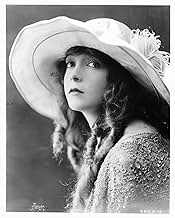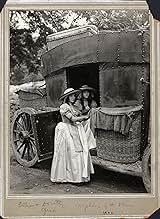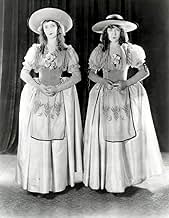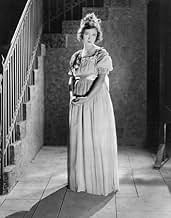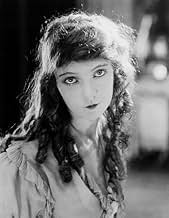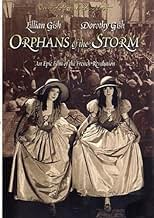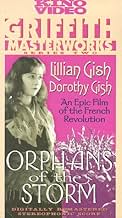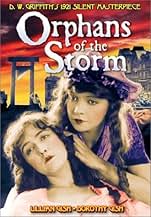Füge eine Handlung in deiner Sprache hinzuTwo orphaned sisters are caught up in the turmoil of the French Revolution, encountering misery and love along the way.Two orphaned sisters are caught up in the turmoil of the French Revolution, encountering misery and love along the way.Two orphaned sisters are caught up in the turmoil of the French Revolution, encountering misery and love along the way.
- Regie
- Drehbuch
- Hauptbesetzung
- Auszeichnungen
- 1 wins total
Empfohlene Bewertungen
The French Revolution used to be a frequent setting for some fine films - between the ideas involved and the upheavals that it brought, it's almost ready-made for cinema. Here, as the two sisters, Lillian and Dorothy are struggling to help each other when they are caught up in the turmoil around them, and they find themselves involved with everyone from the lowest classes of society up to some of the best-known personalities of the Revolution.
The historical background is often stylized, and it is mainly there to lend drama to the story about the sisters, rather than to provide an accurate look at history. The characterizations of some of the revolutionary leaders are interesting, but they are not always accurate. Yet from a purely dramatic viewpoint it works well. The involved story, along with the personal appeal of Gish sisters, combine to win the audience's sympathy quickly, and to heighten the tension as the story plays out. It's a well-acted and memorable melodrama.
History's sweeping drama comes alive in this powerful epic film from legendary silent movie genius D. W. Griffith. Although much happens on a broad canvas, the director never loses sight of the intimate details of the heroines' pitiful plight. In denouncing tyranny, Griffith always manages to keep the viewer engrossed in how the State's insidious evil affects the individual.
Much of the film's success is due to the remarkable acting of the Gish Sisters, Lillian & Dorothy. Acclaimed for her comedic talents, Dorothy here gives an almost completely serious performance, portraying a blind girl cruelly separated from her beloved sister and forced to beg in the streets. Lillian, her classic face mirroring a myriad of emotions, plays the sibling persecuted by both lecherous aristocrats and rapacious revolutionaries. The scene in which Lillian, in an upper chamber, hears Dorothy singing in the alley below but is unable to reach her, is almost unbearable in its emotional intensity.
A young Joseph Schildkraut plays Lillian's blue-blooded suitor, giving the viewer an intimation of the very fine character actor he would become with the advent of talking pictures. Lucille LaVerne steals more than a few scenes as the filthy harridan who enslaves and terrorizes Dorothy. Frank Puglia makes a poignant mark as Miss LaVerne's pathetic, downtrodden son. Comic actor Creighton Hale gives a lively performance in a small role as a mischievous, periwiged servant.
A fascinating aspect of the film is its vivid rendering of two historical characters of great significance in the history of France. Georges Danton was probably not as noble as he is portrayed by Monte Blue, nor was Maximilien Robespierre necessarily as evil as Sidney Herbert depicts him. What is certain is that both men were responsible for the deaths of thousands of individuals during the Reign of Terror. Fittingly, each man had his own rendezvous with Madame Le Guillotine in 1794.
Movie mavens will recognize an unbilled Louis Wolheim as the executioner awaiting Miss Lillian on the scaffold.
Griffith handles the sequences involving surging masses of extras with admirable dexterity. He also freely borrows a few plot elements from Dickens' A Tale of Two Cities. In fact Miss LaVerne, with scarcely a costume change, would play the role of The Vengeance in MGM's 1935 version of that classic, violent novel.
Lillian Gish is Henriette Girard and her sister Dorothy plays her "Sister" Louise. The amazing Joseph Schildkraut plays de Vaudrey, a nobleman who truly is noble. The "storm" in the title refers to the French Revolution, which is the background this story of family and romantic love plays itself upon.
As usual, Lillian Gish is wonderful in her role as the devoted sister Henriette; but it is Dorothy Gish as blind sister Louise who is truly the star of the film. Her performance drips with the pathos, pain, and longing that most people associate with her older sister. Schildkraut shines in this, his first Hollywood film role.
The frequent ridiculous scenes (Danton running to save Henriette from the executioner's blade?) and length of the film will turn most modern viewers off; but those who have a love of history, epic spectacle, and the timeless beauty of the Gish sisters will enjoy "Orphans of the Storm".
DOROTHY GISH and LILLIAN GISH are the sisters, with Dorothy as the blind waif who is separated from her sister when an overly amorous nobleman orders Lillian to be brought to his orgy. From there on, the Dickensian plot becomes thicker and thicker as the girls suffer one indignity after another in order to survive.
LUCILLE LaVERNE is the old hag (she later was the model for Disney's Wicked Witch in "Snow White"), a harridan who makes Dorothy a beggar in the streets. "You'll shiver better without a shawl," is one of her immortal lines.
Joseph SCHILDKRAUT is very impressive in an early American screen role, demonstrating charm and skill of the kind that would land him important parts in future costume films like "Marie Antoinette." MONTE BLUE is Danton, a man who meets LILLIAN GISH early in the story and later becomes the defender who saves her and Schildkraut from the guillotine.
It's all very melodramatic, the acting ranging from overdone to wildly overdone. Griffith was never subtle in asking his performers to give it their all. Excessive wringing of hands, eye-rolling to show anguish, fierce looks to show hatred, etc. may cause unintended chuckles when viewed by today's audiences, but there is never any letdown in the telling of a compelling story using the French Revolution as rich background material for a tale of villainy and heroism.
A fascinating silent film with an appropriate film score added to give the story even more force and flavor.
Summing up: Overlong drama, but compelling from the start to the feverishly melodramatic end.
Exquisite close-ups of Lillian Gish are touching and lend poignant charm to her performance.
All editorializing aside, Griffith's _Orphans of the Storm_ is a shining example of the director's masterful grasp of narrative cinema. The story is almost Dickensian in its feel, from its very beginning alternating between no less than five separate subplots, all of which become inextricably intertwined before the backdrop of the larger plot of the impending revolution in France. The acting performances are not, in fact, excessively overplayed, but are actually quite subtle and touching, especially those of the two orphans, the Gish sisters.
The visuals are stunning: the costumes and decor are lush and the recreation of late 18th century Paris is excellent. Most impressive to me is Griffith's expert command of montage, primarily through intercutting, in creating a engrossing story that, while complex in structure, is easily grasped. The film starts out on wobbly legs, but soon breaks into a steady gallop, raging through the glorious revolution to an admittedly predictable, yet satisfying conclusion. A grand achievement for one of the titans of early cinema: I give it a 9/10.
Wusstest du schon
- WissenswertesWilliam J. Walsh, an extra playing a soldier, was killed on set when a prop rifle he was leaning on went off by accident; although the weapon was loaded with a blank cartridge, the wadding from a blank fired at point-blank range is capable of inflicting serious injury or death.
- PatzerWhen the Bastille is taken, the prisoners are freed. There are many of them. In reality, only seven prisoners were freed during the taking of the Bastille.
- Zitate
Title Card: [Opening lines] TIME, - Before and during the French Revolution. Our story is of two little orphans who suffer first through the tyranny - selfishness - of Kingly bosses, nobles and aristocrats. After the King's Government falls they suffer with the rest of the people as much through the new Government, established by the pussy-footing Robespierre through Anarchy and Bolshevism. Strange that both these evil rulers were otherwise highly moral men except that they saw evil in all who did not THINK AS THEY DID. The lesson - the French Revolution RIGHTLY overthrew a BAD government. But we in America should be careful lest we with a GOOD government mistake fanatics for leaders and exchange our decent law and order for Anarchy and Bolshevism.
- Crazy CreditsThe starring Gish sisters are not listed in the opening credits. They are introduced on title cards as "Louise--Miss Dorothy Gish" and "Henriette--Miss Lillian Gish."
- VerbindungenEdited into Das Kapital im 21. Jahrhundert (2019)
Top-Auswahl
- How long is Orphans of the Storm?Powered by Alexa
Details
- Erscheinungsdatum
- Herkunftsland
- Sprache
- Auch bekannt als
- Orphans of the Storm
- Drehorte
- Mamaroneck, New York, USA(D.W. Griffith: Father of Film)
- Produktionsfirma
- Weitere beteiligte Unternehmen bei IMDbPro anzeigen
Box Office
- Budget
- 1.000.000 $ (geschätzt)
- Laufzeit
- 2 Std. 32 Min.(152 min)
- Sound-Mix
- Seitenverhältnis
- 1.33 : 1


